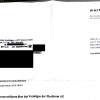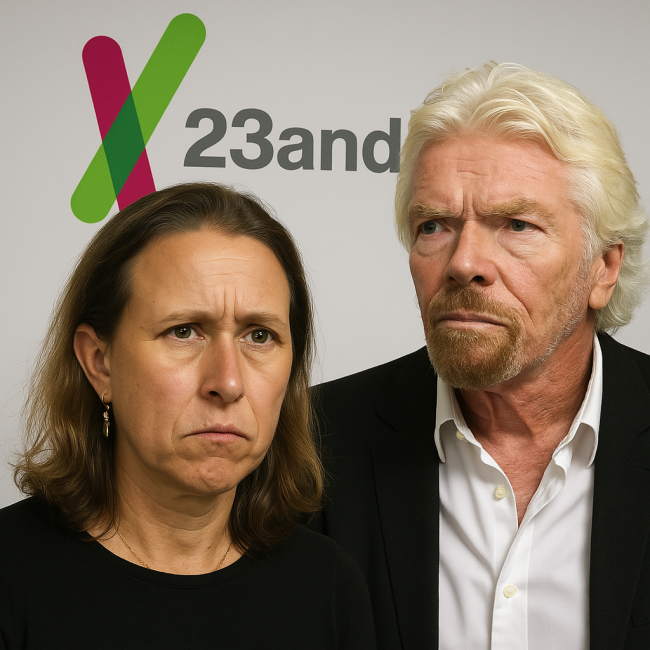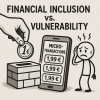
Anne Wojcicki: Rise, Deception, and Fall of 23andMe – and the Questionable Role of Richard Branson
The Moral Bankruptcy of Anne Wojcicki and the Troubled Story of 23andMe – Commentary

From the very beginning, the story of 23andMe—the Silicon Valley genetic testing startup—was an example of what happens when PR fantasies, stock market greed, and personal networks collide with a business model that was never truly viable.
The company was founded in 2006 by Anne Wojcicki, along with Linda Avey and Paul Cusenza. Until 2015, Wojcicki was married to Google co-founder Sergey Brin. The company’s name, “23andMe,” refers to the 23 pairs of human chromosomes.
Anne Wojcicki was quickly celebrated as a leading figure in the genomics revolution, hailed as a star of the feminist gender movement. The media narrative: innovative, female, married to the Google co-founder. In reality, however, much of this narrative was smoke and mirrors from the outset. Investors were lured in with grandiose growth forecasts, the 2021 IPO via SPAC (Special Purpose Acquisition Company) was met with euphoria—and the valuation soared up to $6 billion.
From Myth to Meltdown: A Manufactured Icon
By that point, Wojcicki had become a projection surface for a self-crafted myth: tech pioneer, power woman, savior of personalized medicine. But the reality was sobering: revenues stagnated, data privacy scandals shattered trust, and the business model was neither sustainable nor diversified. While critics warned that 23andMe was built on shaky ground, Wojcicki continued inflating PR balloons with growth promises that now seem like deliberate deception.
Now, in 2025, the downfall is complete: 23andMe is bankrupt, its stock market value reduced to just around $17 to $25 million. And what does Wojcicki do? She resigns—not out of remorse or responsibility. No, she is now attempting to buy back the company’s remaining assets cheaply to stage a comeback—this time on the backs of creditors and possibly taxpayers. Privatizing profits while socializing losses—a principle seen in the 2008 financial crisis with banks—now becomes the blueprint for morally bankrupt entrepreneurship.
A Slap in the Face for Every Honest Entrepreneur
That she again leans on her media image as the “ex-wife of” and “model founder” is not only audacious but a slap in the face for every honest entrepreneur who struggles daily for customers, funding, and trust without millionaire networks and PR stunts.
Calculated Deception, Not Honest Failure
Wojcicki is one of the most toxic symbolic figures of Silicon Valley. Her story is not one of failure in the sense of “learning from mistakes,” but of calculated deception, irresponsibility, and moral coldness. That platforms like Perplexity.ai—more on that below—now try to turn this into a gender fairy tale with a halo is both an intellectual and journalistic disgrace, at least from what is otherwise a strong AI. Facts are bent to preserve a narrative that collapsed long ago: that of the supposedly under-supported woman entrepreneur and her alleged inherent superiority as a startup founder. The facts have told a different story for years.
This is not about denying that female founders often face disadvantages—they do, no question. But it must also be said that a woman can fail—and for the wrong reasons. Anne Wojcicki did not fail due to structural disadvantage, but because she overhyped a product, misled investors, and abandoned ethical principles.
This must be clearly stated—not watered down as a footnote.
Resignation: Right Timing or Too Late?
Wojcicki’s resignation on March 24, 2025, coinciding with the Chapter 11 bankruptcy filing, casts a dubious light on the timing—and hints at strategic motives far beyond the usual narrative of “stepping down in tough times.” Wojcicki openly stated she wanted to position herself better for a potential takeover of the company. The conclusion is clear: She plans a buyback—at fire-sale prices. The very person who hyped the company to its IPO and then ran it into the ground is now hoping to snatch the remaining assets after misleading investors and customers with grand promises.
23andMe was no small startup—it was a project that enjoyed massive initial trust: Google, GlaxoSmithKline, Sequoia Capital, Johnson & Johnson, and others are said to have invested over $1 billion in the company. Wojcicki basked in praise despite data breaches, FDA setbacks, shrinking demand, layoffs, and a catastrophic stock performance.
And now? The resignation wasn’t an admission of guilt—it was part of a plan. As recently as 2024, Wojcicki attempted to acquire 23andMe for just $0.40 per share—a scandalously low offer, rejected by the special committee. A second attempt in March 2025 also failed. Yet she remains on the board—and is determined to buy the company back.
Strategic Coldness Behind a Polished PR Facade
What’s happening here is not tragic failure but a cold strategy: losses are socialized—what remains of value is to be privatized. Wojcicki portrays herself publicly as a responsible founder, but in truth, she’s playing a game of moral audacity: first collect billions, then ruin the company, and finally scoop up the remnants. This is not a comeback. This is calculated opportunism.
Instead of accountability, we see shady maneuvers on the capital market.
It’s hard to shake the impression that her resignation was not an act of responsibility, but a maneuver to elegantly sidestep blame—just in time before accusations of bankruptcy delay could gain traction. Within the scene, it was no secret that 23andMe had been teetering on the edge for months. Instead of pulling the plug in time, appearances were kept up—with grandiose PR offensives while the lights inside were already flickering.
A Carefully Orchestrated Power Game
And Wojcicki herself? Financially, she’s long past worrying. The IPO of 23andMe made her—despite later stock losses—a multimillionaire. As a co-founder and major shareholder, she was in a position to cash in during the stock’s rise, with claims of a $6 billion valuation circulating. Now, with the company worth a mere $17 to $25 million, she appears ready to strike again—as if there had never been a breach of trust with customers, investors, and the public.
Taken as a whole, one suspects this was never just entrepreneurial failure—it was a strategically orchestrated cycle of power and reputation, with losses offloaded onto the public and gains secured privately. Anyone selling Anne Wojcicki’s “comeback” as a tale of empowerment should ask themselves how much calculated ruthlessness they’re willing to include in such a narrative.
A true role model? Certainly not.
Rather a case for the next discussion on ethics, power, and responsibility in Silicon Valley.
Perplexity.ai: When Gender PR Becomes Reality Denial
Things get absurd when one looks at Perplexity.ai’s response to the simple prompt: “Write a critical analysis of the bankruptcy of 23andMe and Anne Wojcicki’s role.” What follows is not critical analysis, but an ideologically charged text juggling selectively chosen statistics and feminist success myths—while almost completely ignoring the core issue of Wojcicki’s business responsibility and systematic failure. On AI Perplexity
Perplexity quotes the following figures:
“Startups with female founders or co-founders outperform all-male founder teams by 63% in VC returns.”
“For every dollar invested, startups with at least one female founder generate 78 cents in revenue, compared to 31 cents for all-male startups.”
These numbers come from femaleinvest.com, a platform aiming to encourage women to invest—a legitimate goal, but the figures are neither methodologically transparent nor based on serious primary research.
Ideology vs. Empiricism: The Dangerous Shift
Another claim:
“Only 2% of venture capital in the U.S. goes to all-female founder teams.”
This figure is often quoted, but based on a thin dataset and more often amplified by ideological gender politics than by hard economic reality. The complexity of access to capital—networks, industry structure, scalability—is ignored. And Wojcicki herself was the opposite of underfunded: she had access to capital, networks, and media—and squandered it all.
The Perplexity text culminates in this absurd sentence:
“The statistics show that female founders often outperform.”
No context, no empirical basis, no control groups—but maximum confidence turns an ideological thesis into an alleged statistical fact.
The real scandal: the bankruptcy of a billion-dollar company, accompanied by data scandals, investor deception, and a CEO resignation with strategic undertones, is pushed aside to tell a gender narrative that has nothing to do with the reality of 23andMe.
That’s not analysis. That’s PR. And it’s dangerous.
Perplexity: Founding, Headquarters, Investors like Amazon-Jeff Bezos, and Partnerships like Deutsche Telekom
The search engine Perplexity was founded in August 2022 and is headquartered in San Francisco, California. The company was founded by Aravind Srinivas (CEO, previously at OpenAI, Google, and DeepMind), Andy Konwinski (President, previously co-founder of Databricks), Denis Yarats (CTO, former AI researcher at Meta), and Johnny Ho (CSO, formerly at Quora).
Among the most prominent investors is Jeff Bezos, founder of Amazon and one of the richest individuals in the world. Through his investment firm Bezos Expeditions, he regularly invests in emerging technologies and AI companies. Also involved is Nvidia, the global market leader in graphics processing units (GPUs), which plays a central role in the AI boom and is already invested in several technology firms such as OpenAI, Runway, and Recursion. Another key investor is B Capital, an investment firm co-founded by Facebook co-founder Eduardo Saverin, which focuses on high-growth companies in the fields of AI, fintech, and healthcare.
In addition, Perplexity is pursuing an international partnership strategy, including a collaboration with Deutsche Telekom, German Telekom, to expand the reach of the search engine across Europe and leverage technological synergies.
Billion-Dollar Fantasy: Richard Branson and the PR Bubble
Especially concerning is the question of how realistic the supposed multi-billion-dollar valuations of 23andMe Holding Co. ever were. The official IPO on June 17, 2021, via SPAC merger with VG Acquisition Corp.—Richard Branson’s vehicle—valued the company at $3.5 billion. Yet soon after, PR spun a $6 billion valuation, based not on earnings, but on vague future promises and hype about “revolutionizing personalized medicine.”
23andMe raised $592 million during the IPO, with the goal of expanding its consumer genetics and therapeutics segment. For 2,000 employees, even in Germany, that would require €80 to €140 million annually. Salaries in the U.S. are higher in some areas—but not all. So where did the money go? Wojcicki promised to “rethink health,” Branson claimed 23andMe could transform healthcare. New board members: Evan Lovell (Virgin Group) and Peter Taylor (ECMC Foundation)—finance and education experts, not medical innovators.
Just 300 to 500 Employees – Where Did the Money Go?
Based on the most recent available information, 23andMe laid off 200 employees in November 2024, which was reported at the time to represent around 40 percent of the total workforce. This suggests that prior to the layoffs, 23andMe had approximately 500 employees. After the cuts, only about 300 staff members remained at the company. Back in 2018, the company reportedly had just 229 employees on board.
This raises serious questions: How can such a small company burn through so much money? Who profited from this? The suspicion of potential investor fraud is hard to ignore.
From Vision to Spectacle: A PR-Driven Exit
Today, March 26, 2025, 8:00 AM CET, little of that remains: the market cap is just $17 million, the stock (Ticker: ME) is a penny stock. The company once seen as the spearhead of DNA-based health is facing liquidation—and Wojcicki wants to scoop up the leftovers, having already cashed out.
The deal with Branson now seems less like a healthcare vision and more like a spectacular PR exit. For retail investors, it was a disaster. The gap between media-generated glamour and economic collapse is not just sobering—it’s a textbook case of systemic deception through celebrity capital and pseudo-innovation.









